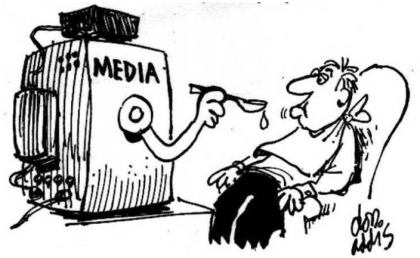
Description
Office Hours: Friday 1-2:45PM (by request)
Professor’s Office: H-1125.12
Class Time: Friday 2:45-5:30PM
Classroom – MB 1.210
Politics and media studies are interrelated and multifaceted topics. Newspapers, radio, TV, and the internet are some of many media forms that carry messages about political ideas, social relations and prevailing power structures. Signs and symbols can be creative and/or coercive. They can be used to educate people about world issues so that people can participate in political platforms as informed citizens; however they can also be used to misinform the public in order to manage public opinion and push a specific political agenda. A variety of political actors, such as political parties, pressure groups, people with wealth and influence, and concerned citizens everywhere use media to their advantage – some with more, others with less success.
Changes in technology have revolutionized the social, economic and political landscape. Global communication has been facilitated by the proliferation of portable communication devices and social media platforms. Internet sites, like Facebook and Twitter have allowed people to become amateur journalists and political commentators. In 2014, in Ferguson, Missouri, protesters themselves broadcast the demonstrations against police brutality allowing the world to witness their uprising; recently in Syria, civilians have been livestreaming the aftermath of the bombing campaigns and gas attacks; even the president of the U.S.A Donald Trump, has been informing citizens about policy reforms and executive orders via Twitter.
In this course, we will examine the interaction between politics and media by looking at how technological changes in communication has shaped political life. We will use a multidimensional framework considering the complex relationship between media producers, spectators, messages and technologies as well as the political and socio-economic environment from which media is produced and received.
In this course, we will address questions like: What is the key to effective media management? Who controls what gets onto the media and what gets excluded? What makes something newsworthy? Why are some issues covered and many others ignored? How does the media shape our political culture, our minds and identities as a people? What can we do to ensure, that this instrument that plays such a powerful role in the formation of our political consciousness, remains fair, and factual? How can we ensure that the media does not fall into the hands of those who are driven by selfish or vested interests?
By the end of this course, students will:
- Understand the complex inter-relationship between the media and politics and the impact of technological changes on democratic governance
- Be sensitive to the language of political deception, the use of illusion as an instrument to manufacture consent
- Understand the use of marketing, advertising, public relations, public opinion research as tools of political persuasion
- Be familiar with the ideas of the most significant theorists in this field
- Know how the news agenda is set and how media managers filter the news
- Understand the emerging role of the internet in the political electoral process
- Have explored ways to enhance the social responsibility of the media
Course Materials and Text:
Students are expected to complete ALL the designated readings and watch ALL of the assigned videos BEFORE EACH CLASS. Students are also expected to attend ALL classes, and participate in class discussions.
The required readings for this course is contained in a course-pack available at the library bookstore. Please see the course schedule below for the dates the readings are due.
Recommended Readings (available at the Concordia Coop Bookstore):
Nesbitt-Larking, P. (2009) Politics, Society and the Media (2nd Edition), Broadview Press.
Taras, D. (2015) Digital Mosaic; Media, Power and Identity in Canada, University of Toronto Press
Marland, A. Giasson T, Lawlor, A (2018) Political Elites in Canada: Power and Influence in Instantaneous Times, UBC Press
The professor’s power-point lecture notes will be posted on the course site on a weekly basis before each class.
Students are encouraged to watch the following documentary movies:
The Century of the Self (2002) – Adam Curtis
The Persuaders (2003) – Barak Goodman and Rachel Dretzin
Manufacturing Consent (1992) – Mark Achbar and Peter Wintonick
Control Room (2004) – Jehane Noujaim
Operation Hollywood (2004) – Emilio Pacull
This Film is Not Yet Rated (2006) – Kirby Dick
We are Legion: The Story of Hacktivists (2012) – Brian Knappenberger
Recommended readings: URLs and other electronic sources may be posted on the course website from time to time. Please visit the course website to get this material. These are only for interest and are not required.
Course Format
This course will consist of a variety of pedagogical styles including lectures, discussions, guest speakers, and community service learning. Students are expected to read the required text and/or watch the assigned movie before coming to class. In class, students will engage with each other through interactive activities, discussions and by talking with invited media professionals and political actors.
Course Evaluation
Exam 1 30%
Exam 2 30%
Short Paper 20%
Research Project Report 15%
Class Participation 5%
Letter Grade Equivalency
Your numerical grades will be converted to letter grades as follows:
A+ (93 – 100%) B+ (77 – 79.9%) C+ (67 – 69.9%) D+ (57– 59.9%)
A (85 – 92.9%) B (73 – 76.9%) C (63 – 66.9%) D (53 – 56.9%)
A- (80 – 84.9%) B- (70 – 72.9%) C- (60 – 62.9%) D- (50 – 52.9%)
F < 50%
Lecture Schedule: Themes and Required Readings
This is a TENTATIVE schedule and is subject to change. Be sure to consult the course website regularly to be aware of any changes.
Course schedule, Topics and Required readings:
January 11 Introduction
Nesbitt-Larking, P. (2009) Politics, Society and the Media (2nd Edition), Broadview Press. (Pages 15, 16 and 17)
January 18 History of the Canadian Mass Media
Nesbitt-Larking, P. (2009) Politics, Society and the Media (2nd Edition), Broadview Press. (Chapter 2 and 3)
January 25 Time, Space, Culture, Nation
Robinson, D. (2009) Communication History in Canada, Oxford University Press. (Section 2)
February 1 No Class
February 8 Media in the Political, Socio-Economic Environment
Nesbitt-Larking, P. (2009) Politics, Society and the Media (2nd Edition), Broadview Press. (Chapter 4)
Taras, D. (2015) Digital Mosaic; Media, Power and Identity in Canada, University of Toronto Press, (Chapter 1)
February 15 Political Economy of the Media in Canada
Nesbitt-Larking, P. (2009) Politics, Society and the Media (2nd Edition), Broadview Press. (Chapter 5)
Winseck, D. (2016) Media Ownership in Canada. In Who Owns the World’s Media, Oxford University Press. (Chapter 17)
February 22 Mid-Term Exam
March 8 Short Paper Due – Discussion about Research Project
March 15 State and Political Regulating of the Media
Nesbitt-Larking, P. (2009) Politics, Society and the Media (2nd Edition), Broadview Press. (Chapter 6)
March 22 Media Organizations
Nesbitt-Larking, P. (2009) Politics, Society and the Media (2nd Edition), Broadview Press. (Chapter 7 & 13)
March 29 Construction and Deconstruction of Texts
Nesbitt-Larking, P. (2009) Politics, Society and the Media (2nd Edition), Broadview Press. (Chapter 10)
Riffe, D., Lacy, S., Fico, F. (2014) Analyzing Media Messages; Using Quantitative Content Analysis in Research, 3rd edition, Routledge. (Chapter 1 and 2)
April 5 Media Effects – Politics of Reading
Danesi, M. (2010) Semiotics of Media and Culture. In Cobley, P., The Routledge Companion to Semiotics, Routledge. (Chapter 9)
Nesbitt-Larking, P. (2009) Politics, Society and the Media (2nd Edition), Broadview Press. (Chapter 9 & 11)
Taras, D. (2015) Digital Mosaic; Media, Power and Identity in Canada, University of Toronto Press, (Chapter 4)
April 12 Media, Technology and Privacy
Dwyer, T., (2016), Convergent Media and Privacy, Palgrave MacMillan. (Chapter 5)
Goggin, G. (2012), New Technologies and the Media, Palgrave MacMillan. (Chapter 2)
Taras, D. (2015) Digital Mosaic; Media, Power and Identity in Canada, University of Toronto Press, (Chapter 5)
Late assignment policy:
Unless you are given permission in advance, late assignments will not be accepted without adequate documentation of medical or personal emergencies.
Handing in Assignments:
All assignments MUST be submitted in hard copy at the beginning of class on the due date. Any assignment submitted electronically will be subject to a reduction of 25% of the value of the assignment.
A list of Student Services and Useful Resources
Counselling and Psychological Services: http://concordia.ca/students/counselling-life-skills
Concordia Library Citation and Style Guides: http://library.concordia.ca/help/howto/citations
Student Success Centre: http://concordia.ca/students/success
Health Services: http://concordia.ca/students/health
Financial Aid and Awards: http://concordia.ca/offices/faao
HOJO (Off Campus Housing and Job Bank): http://csu.qc.ca/hojo
Academic Integrity: http://concordia.ca/students/academic-integrity
Access Centre for Students with Disabilities: http://concordia.ca/offices/acsd
CSU Advocacy Centre: http://csu.qc.ca/advocacy
Dean of Students Office: http://concordia.ca/offices/dean-students
International Students Office: http://concordia.ca/students/international
Student Hub: http://concordia.ca/students
Sexual Assault Resource Centre: http://concordia.ca/students/sexual-assault.html
Indigenous Directions: http://concordia.ca/about/indigenous.html
University Rights and Responsibilities
Academic Integrity: “The Academic Code of Conduct sets out for students, instructors and administrators both the process and the expectations involved when a charge of academic misconduct occurs. The regulations are presented within the context of an academic community which seeks to support student learning at Concordia University.” (From Article 1 of the Academic Code of Conduct). Full text:
http://www.concordia.ca/students/academic-integrity/offences.html
Plagiarism: The most common offense under the Academic Code of Conduct is plagiarism, which the Code defines as “the presentation of the work of another person as one’s own or without proper acknowledgement.” This includes material copied word for word from books, journals, Internet sites, professor’s course notes, etc. It refers to material that is paraphrased but closely resembles the original source. It also includes for example the work of a fellow student, an answer on a quiz, data for a lab report, a paper or assignment completed by another student. It might be a paper purchased from any source. Plagiarism does not refer to words alone –it can refer to copying images, graphs, tables and ideas. “Presentation” is not limited to written work. It includes oral presentations, computer assignment and artistic works. Finally, if you translate the work of another person into any other language and do not cite the source, this is also plagiarism. In Simple Words: Do not copy, paraphrase or translate anything from anywhere without saying where you obtained it! Source: Academic Integrity Website: http://concordia.ca/students/academic-integrity
Disabilities: The University’s commitment to providing equal educational opportunities to all students includes students with disabilities. To demonstrate full respect for the academic capacities and potential of students with disabilities, the University seeks to remove attitudinal and physical barriers that may hinder or prevent qualified students with disabilities from participating fully in University life. Please see the instructor during the first class if you feel you require assistance.
For more information please visit http://concordia.ca/offices/acsd
Safe Space Classroom: Concordia classrooms are considered ‘safe space classrooms’. In order to create a climate for open and honest dialogue and to encourage the broadest range of viewpoints, it is important for class participants to treat each other with respect. Name-calling, accusations, verbal attacks, sarcasm, and other negative exchanges are counter-productive to successful teaching and learning. The purpose of class discussions is to generate greater understanding about different topics. The expression of the broadest range of ideas, including dissenting views, helps to accomplish this goal. However, in expressing viewpoints, students should try to raise questions and comments in ways that will promote learning, rather than defensiveness and feelings of conflict in other students. Thus, questions and comments should be asked or stated in such a way that will promote greater insight into the awareness of topics as opposed to anger and conflict. The purpose of dialogue and discussion is not to reach a consensus, nor to convince each other of different viewpoints. Rather, the purpose of dialogue in the classroom is to reach higher levels of learning by examining different viewpoints and opinions with respect and civility.
I acknowledge that Concordia University is located on unceded Indigenous lands. The Kanien’kehá:ka Nation is recognized as the custodians of the lands and waters on which we gather today. Tiohtiá:ke/Montreal is historically known as a gathering place for many First Nations. Today, it is home to a diverse population of Indigenous and other peoples. We respect the continued connections with the past, present and future in our ongoing relationships with Indigenous and other peoples within the Montreal community. (Indigenous Directions Leadership Group, Feb. 16, 2017)





